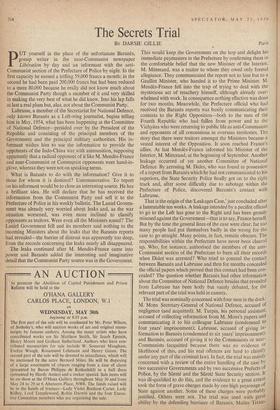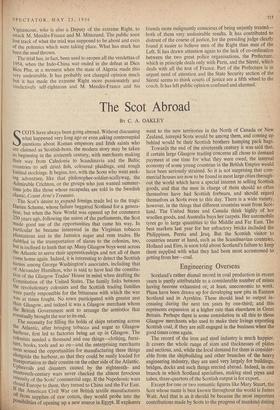The Secrets Trial
pUT yourself in the place of the unfortunate Baranes, gossip writer in the near-Communist newspaper Liberation by day and an informant with the anti- Communist section of the Prefecture of Police by night. In the first capacity he earned a trifling 59,000 francs a month; in the second he had been paid 200,000 francs but had been reduced to a mere 80,000 because he really did not know much about the Communist Party though a member of it and very skilled in making the very best of what he did know. Into his lap falls at last a real plum but, alas, not about the Communist Party.
Labrusse, a member of the Secretariat for National Defence, only knows Baranes as a Left-wing journalist, begins telling him in May, 1954, what has been happening at the Committee of National Defence—presided over by the President of the Republic and consisting of the principal members of the Government and the principal military authorities. His in- formant wishes him to use the information to provide the oppdnents of the Indo-China war with ammunition, supposing apparently that a radical opponent of it like M. Mendes-France and near-Communist or Communist opponents were hand-in- glove, whereas they were not on speaking terms.
What is Baranes to do with the information? Give it to those for whom it is destined? Unremunerative. To report on his informant would be to close an interesting source. He has a brilliant idea. He will declare that he has received the information from the Communist Party and sell it to the Prefecture of Police in his weekly bulletin. The Laniel Govern- ment Was already very worried about leaks and, as the war situation worsened, was eVen more inclined to classify opponents as traitors. Were even all the Ministers sound? The Laniel Government fell and its members said nothing to the incoming Ministers about the leaks that the Baranes reports had revealed—the barrier of distrust was apparently too deep. Even the records concerning the leaks nearly all disappeared.
The leaks continued after M. Mendes-France came into power and Baranes added the interesting and imaginative detail that the Communist Party source was in the Government. This would keep the Government on the hop and delight his immediate paymasters in the Prefecture by confirming them in the comfortable belief that the new Minister of the Interior, M. Mitterand, was a traitor to whom they owed only formal allegiance. They communicated the report not to him but to a Gaullist Minister, who handed it to the Prime Minister. M. Mendes-France fell into the trap of trying to deal with the mysterious act of treachery himself, although already over- whelmed with work. In consequence nothing effective was done for two months. Meanwhile, the Prefecture official who had received the Baranes reports was busily communicating their contents to the Right Opposition—both to the men of the Fourth Republic who had fallen from power and to the Vichyites who were returning to public life as anti-Communists and opponents of all concessions in overseas territories. The story that there were traitors amongst the Ministers became a vested interest of the Opposition. It soon reached France's allies. At last Mendes-France informed his Minister of the Interior, M. Mitterand, at the beginning of September. Another leakage occurred of yet another Committee of National Defence. By arresting M. Dides, who was found in possession of a report from Baranes which he had not communicated to his superiors, the State Security Police finally got on to the right track and, after some difficulty due to sabotage within the Prefecture of Police, discovered Baranes's contact with Labrusse.
That is the origin of the 'Leakages Case,' just concluded after a lamentable ten weeks. A leakage intended by a pacifist official to go to the Left has gone to the Right and has been grossly misused against the Government—that is to say, France herself. But by the time the general lines of the case were clear, far too many people had put themselves badly in the wrong for the case to go straight. Many points, in fact, remain obscure. The responsibilities within the Prefecture have never been cleared up. Who, for instance, authorised the members of the anti- Communist section of the Prefecture to burn all their records when Dides was arrested? Who tried to conceal the contact between Baranes and Labrusse and then for months concealed the official papers which proved that this contact had been con- cealed? The question whether Baranes had other information about the Committee of National Defence besides that revealed frOm Labrusse has been hotly but vainly debated, for the relevant part of the trial was held in camera.
The trial was nominally concerned with four men in the dock: M. Mons. Secretary-General of National Defence, accused of negligence (and acquitted); M. Turpin, his personal assistant. accused of collecting information from M. Mons's papers and communicating it to his colleague Labrusse (condemned to four years' imprisonment): Labrusse, accused of giving in' formation to Baranes (condemned to six years' imprisonment); and Baranes, accused of giving it to the Communists or near Communists (acquitted because there was no evidence or likelihood of this, and his real offences are hard to claSsify under any part of the criminal law). In fact, the trial was main1Y concerned with a review of the entire handling of the case by two successive Governments and by two successive Prefects of Police, by the Sfirete and the Surete State Security section. It was ill-qualified to do this, and the evidence to a great extent took the form of grave charges made by one high per,sonage of State against another. Some of these charges were probab1Y justified. Others were not. The trial was used with great ability by the defending barrister of Baranes, Maitre Tixier- Vignancour, who is also a Deputy of the extreme Right, to attack M. Mendes-France and M. Mitterand. The public soon lost track of what the trial, was supposed to be about and even Of the polemics which were taking place. What has stuck has been the mud thrown.
The trial has, in fact, been used to reopen all the vendettas of 1954, when the Indo-China war ended in the defeat at Dien I3ien Phu, at a moment when the state of Algeria made this very undesirable. It has probably not changed opinion much but it has made the 'extreme Right more passionately and vindictively self-righteous and M. Mendes-France and his friends more indignantly conscious of being unjustly treated— both of them very undesirable results. It has contributed to distrust of the course of justice, for the presiding judge clearly found sit easier to believe men of the Right than men of the Left. It has drawn attention again to the lack of co-ordination between the two great police organisations, the Prefecture, which in principle deals only with Paris, and the StIret6, which deals with all the rest of France. Part of the Prefecture is in urgenf need of attention and the State Security section of the Sarete. seems to think courts of justice are a fifth wheel to the coach. It has left public opinion confused and alarmed.











































 Previous page
Previous page